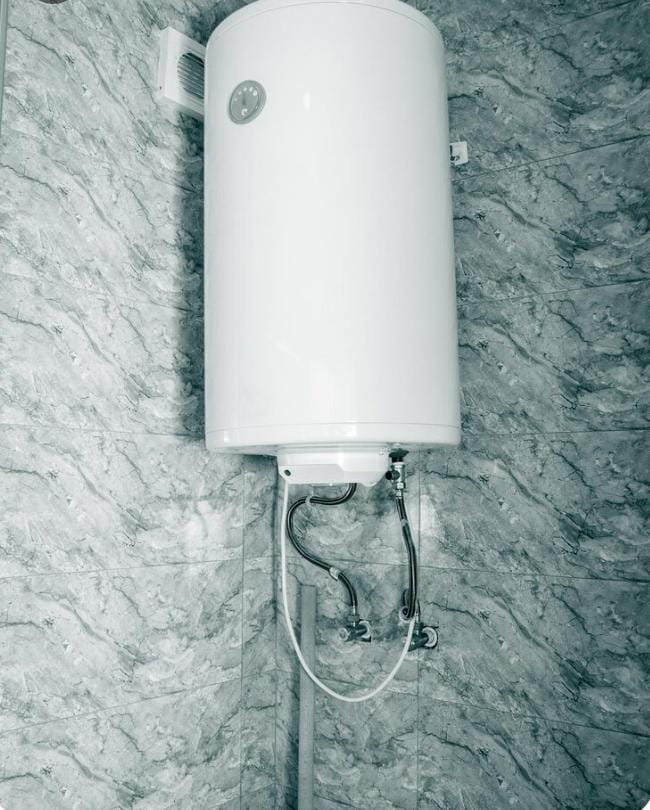Types of Water Heaters
Several types of water heaters serve residential and commercial needs, each with unique methods and energy profiles:
- Storage Water Heaters: These are the most common and feature an insulated tank that stores hot water for immediate use. They can be powered by gas or electricity and hold between 20 and 80 gallons. A thermostat ensures the water is always heated to the right temperature, though energy losses occur due to the constant storage of hot water.
- Tankless (On-Demand) Water Heaters: Unlike storage models, tankless units heat water instantly as it passes through coils, resulting in endless hot water with no standby heat loss. These systems are powered by gas or electricity and are highly energy-efficient, making them increasingly popular in new builds.
- Heat Pump (Hybrid) Water Heaters: Using electricity to move heat from the air or ground into the water, rather than generating heat directly, these efficient units can cut energy use by up to 60% compared to conventional models.
- Solar Water Heaters: Harnessing energy from the sun, these systems can slash water heating costs but require sunny climates and a higher initial investment. There are passive and active types, with active models using pumps for circulation.
- Gas Water Heaters: Gas-powered models can be storage-type or tankless. They use natural gas or propane as a heat source and are valued for quick heating ability and lower cost compared to electricity in some areas.
How Water Heaters Work
The process by which a water heater heats water depends on its type:
- Storage Water Heaters: Cold water enters the tank, is heated by a gas burner or electric element, and stays hot until used. When the tank’s water temperature drops below a preset threshold, heating resumes automatically.
- Tankless Water Heaters: Sensors detect water flow when a hot tap is opened. The heater instantly fires up a heating element or burner, warming the water as it moves through internal coils.
- Heat Pump Water Heaters: A fan pulls warm air into the unit, then a compressor and coils transfer and amplify this heat into the water tank below.
- Solar Water Heaters: Solar collectors (usually mounted on a roof) absorb sunlight, heating a fluid that either stores heat in a tank (in direct systems) or exchanges it via a heat exchanger (in indirect systems).
Advantages and Disadvantages
Each water heater type offers distinct pros and cons based on context and user needs:
- Storage Heaters: Reliable and affordable upfront but less efficient due to heat loss from stored water.
- Tankless Models: Provide unlimited hot water, save space, and are energy-efficient, but often cost more to install and may require infrastructure upgrades.
- Heat Pump Heaters: Extremely efficient and offer lower long-term costs but feature higher purchase prices and require more installation space.
- Solar Heaters: Environmentally friendly and cost-effective in sunny climates but expensive to install, with variable performance in cloudy or cold regions.
- Gas Heaters: Offer fast water heating and can be less expensive in places where natural gas is cheap, but they require venting for exhaust gases and regular safety checks.
Efficiency and Environmental Impact
Modern water heaters focus on efficiency and environmental impact:
- Tankless and heat pump heaters represent the best in efficiency, with reduced standby energy loss and lower greenhouse gas emissions over their lifecycles.
- Solar water heaters offer a sustainable hot water solution, especially when combined with energy storage or backup systems for cloudy days.
- Maintenance, such as annual flushing or sediment checks, can significantly extend a unit’s lifespan and efficiency.
Maintenance and Longevity
Regular maintenance ensures the best performance and longevity:
- Storage tanks should be flushed regularly to remove sediment buildup that can damage heating elements and reduce efficiency.
- Tankless heaters require periodic descaling, especially in hard water areas.
- Heat pump and solar systems need occasional checks on fluid levels, filters, and electronic controls to function optimally.
Typical lifespans:
- Storage tank: 10–15 years.
- Tankless: 20+ years.
- Heat pump: 10–15 years.
- Solar: 15–20 years with regular maintenance.
Choosing the Right Water Heater
Selection depends on household size, water usage habits, energy costs, installation space, and budget:
- Small households or those short on space may prefer tankless models.
- Large families often benefit from storage or hybrid systems.
- Homeowners in sunny regions should consider solar heaters for long-term savings.
Conclusion
Water heaters are central to comfort and hygiene, available in a range of types to suit modern efficiency and environmental standards. Whether upgrading for efficiency, capacity, or eco-friendliness, careful selection and regular maintenance will ensure a reliable supply of hot water for years to come.

